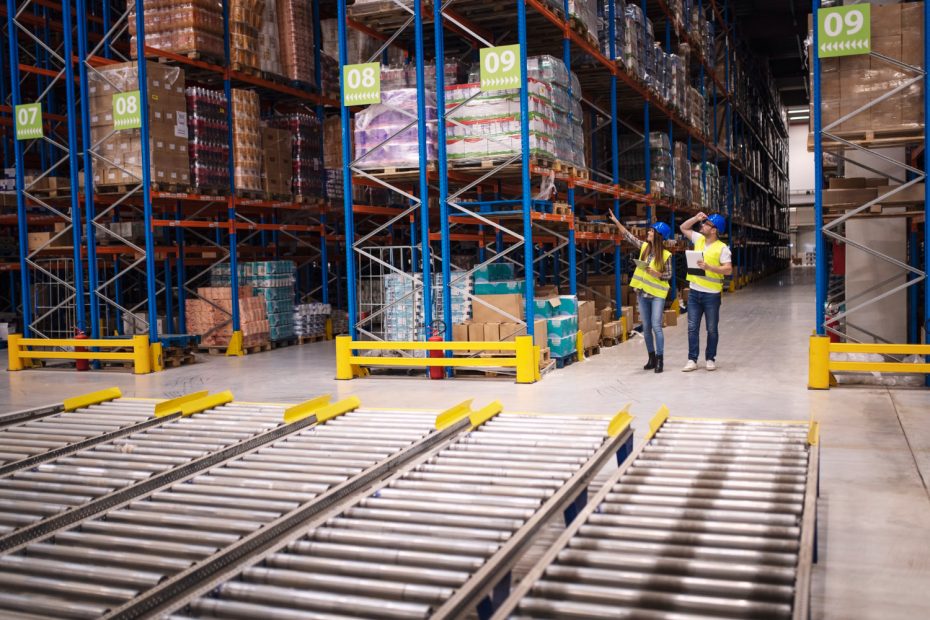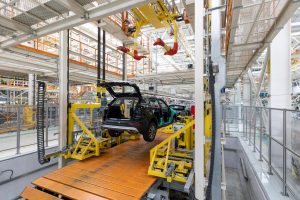The industrial sector in Indonesia is growing rapidly, especially in logistics, manufacturing, distribution, and e-commerce. Intense business competition requires companies to move faster, more accurately, and efficiently in managing goods and supply chains. In this situation, conventional warehouses often fail to meet the demands. Limited space, high labor costs, and the risk of manual errors become major obstacles. Therefore, many companies are now switching to automated warehouses that are more modern and integrated with technology.
Automated warehouses allow businesses to speed up storage, increase capacity, and reduce operational costs. To make this possible, you need Automated Warehouse Construction Services that are experienced and capable of delivering solutions tailored to your business needs.
If you are currently searching with the keyword “Looking for Automated Warehouse Construction Services? Here’s the Best Solution”, then you are in the right place. This article will thoroughly discuss what an automated warehouse is, why it is essential for businesses, and how to choose the right contractor. With the support of Automated Warehouse Construction Services, you can build a modern facility that is efficient, safe, and ready to face the challenges of the future industrial landscape.
What Is an Automated Warehouse?
An automated warehouse is a modern storage facility that utilizes advanced technology to accelerate logistics processes—from receiving goods to storage and distribution. Unlike conventional warehouses that rely heavily on manual labor, automated warehouses depend on integrated systems that work faster, more accurately, and consistently. With the help of Automated Warehouse Construction Services, companies can build organized, efficient facilities while saving long-term costs.
Some commonly used technologies in automated warehouses include:
-
Automated Storage and Retrieval System (AS/RS): manages tall racks automatically for maximum space efficiency.
-
Conveyor Systems: speeds up goods transfer between warehouse areas.
-
Robotic Handling: reduces the risk of human error.
-
Warehouse Management System (WMS): records, tracks, and controls goods data in real-time.
-
IoT and Smart Sensors: allow digital monitoring of warehouse conditions.
The role of Automated Warehouse Construction Services is crucial—not only in building the physical structure but also in aligning the warehouse design with the technology that will be used. This integration ensures optimal functionality, supports business growth, and prepares companies to face modern industry competition.
Why Are Automated Warehouses Essential?
Building an automated warehouse with the help of Automated Warehouse Construction Services brings numerous benefits:
1. Operational Efficiency
Automated warehouses streamline workflows from storage and retrieval to distribution. Processes that once took significant time manually can now be completed much faster with conveyors, robots, and AS/RS systems. With a well-planned design from Automated Warehouse Construction Services, bottlenecks can be avoided, productivity increases significantly, operational costs are reduced, and customer service becomes faster.
2. Reduced Labor Costs
Manual labor dependency often results in high expenses, from salaries to ongoing training. Automated warehouses reduce the need for operational workers, lowering long-term costs. Although initial investment may be high, with Automated Warehouse Construction Services the systems installed will help achieve ROI faster. Automation can work longer without fatigue, maintain consistent performance, and save costs over time.
3. High Accuracy
Human errors, such as stock miscounts or shipping mistakes, can be costly. Automated warehouses, supported by robotics, smart sensors, and WMS software, minimize these risks. Every item movement is automatically recorded, ensuring high accuracy. This improves inventory management, reduces returns, and boosts customer satisfaction. Businesses also gain real-time data for better decision-making.
4. Space Optimization
A classic challenge in warehousing is limited land, especially in urban areas where land costs are high. Automated warehouses maximize vertical space with tall racks and robotics. With a design from Automated Warehouse Construction Services, every square meter can be fully optimized. This increases storage capacity without expanding building size while keeping workflows efficient.
5. Supporting Business Growth
Modern businesses demand flexibility and scalability. Automated warehouses can easily adjust capacity when demand rises, without requiring additional manpower. Automated Warehouse Construction Services will design facilities that are ready for future growth. With integrated systems, businesses can handle seasonal demand spikes or market expansion more smoothly—making automated warehouses a vital investment for long-term growth.
The Key Role of Automated Warehouse Construction Services
Building an automated warehouse requires expertise beyond conventional construction. Here are the key roles of Automated Warehouse Construction Services:
1. Designing an Efficient Layout
The first stage of automated warehouse development is creating a highly efficient design or layout. Automated Warehouse Construction Services tailor the design to the company’s operational needs, including goods flow, storage areas, and automated distribution systems. A well-planned layout ensures smooth workflows, minimizes bottlenecks, and optimizes space utilization. With the right design, businesses gain a modern warehouse that truly supports high productivity.
2. Ensuring Building Quality
An automated warehouse is not the same as a traditional warehouse. The structure must be stronger to withstand heavy loads from tall racks, conveyors, robotic machines, and other automated equipment. Automated Warehouse Construction Services guarantee the use of high-quality materials and compliance with construction standards and regulations. As a result, the warehouse is not only safe but also durable in the long term, reducing future maintenance costs.
3. Technology Integration
Automated warehouses require seamless integration between physical construction and digital systems. Automated Warehouse Construction Services coordinate with technology vendors to ensure smooth installation of software, sensors, robots, and warehouse management systems (WMS). Without proper integration, even the most advanced technologies will not function optimally. With experienced contractors, the automated warehouse becomes a digitally connected modern distribution hub.
4. Budget and Time Efficiency
Building an automated warehouse requires significant investment, but with the right strategies, costs can be optimized. Automated Warehouse Construction Services know how to select materials, technologies, and working methods that are cost-efficient without compromising quality. Moreover, experienced contractors can manage project timelines to ensure on-time completion. This efficiency in budget and time is crucial, allowing businesses to start operating the automated warehouse and achieving returns faster.
Steps to Building an Automated Warehouse
With the support of Automated Warehouse Construction Services, here are the typical stages involved in the development process:
1. Needs Analysis
The first stage is conducting a thorough needs analysis. Automated Warehouse Construction Services will help determine the types of goods to be stored, the volume of goods movement, and long-term expansion plans. This analysis is crucial to ensure that the warehouse design truly fits the business requirements. Through site surveys, management interviews, and distribution flow evaluations, contractors can better understand the company’s main challenges. With accurate analysis, the automated warehouse will be more efficient, measurable, and ready to support future business growth.
2. Planning and Design
Once the needs are understood, the next step is creating a detailed blueprint for the automated warehouse. Automated Warehouse Construction Services will design layouts that include conveyor routes, high-rack placements, loading-unloading areas, and electrical needs to support automated machines. A well-prepared design minimizes construction errors while ensuring smooth logistics operations. This planning also considers space efficiency, building safety, and flexibility for future expansion.
3. Legal Compliance
Legal compliance is an essential aspect of building an automated warehouse. Contractors of Automated Warehouse Construction Services usually assist in managing building permits, occupancy certificates, and environmental regulations. With complete permits, the project will not be hindered by administrative issues later on. Obtaining legal approvals also ensures the warehouse is built according to national regulations and workplace safety standards. This is vital for companies to operate their automated warehouses without legal risks.
4. Construction Process
The next stage is the physical construction of the warehouse. Automated Warehouse Construction Services use high-quality materials capable of supporting large racks, conveyors, and automated machines. During this stage, contractors also pay attention to structural details such as heavy-duty flooring, proper ventilation systems, and stable electrical installations. The construction process is carried out on schedule and under strict supervision to ensure the building matches the design. The result is a strong, safe warehouse, ready for automation system installation.
5. Installation of Automation Systems
After the building is complete, the next step is installing automation equipment. Automated Warehouse Construction Services work closely with technology vendors to set up conveyors, AS/RS, robotic handling systems, and Warehouse Management Software (WMS). This integration ensures both physical and digital systems work seamlessly together. Installation is carried out under high safety standards so the technology can operate at its maximum potential. With automation systems in place, the warehouse will function more efficiently, quickly, and accurately.
6. Testing and Training
The final stage is operational testing and employee training. Automated Warehouse Construction Services ensure that all systems function as planned before the warehouse is fully utilized. Testing includes simulations of storage, item retrieval, and distribution processes. In addition, contractors provide training for staff to operate the new systems correctly. With proper training, the transition from a manual warehouse to an automated one can run smoothly without disrupting business productivity.
Tips for Choosing Automated Warehouse Construction Services
Choosing a contractor should not be taken lightly. Here are some important tips:
1. Check the Portfolio
A portfolio reflects the contractor’s experience. Professional Automated Warehouse Construction Services usually have a track record of similar projects, from logistics warehouses to large-scale industrial facilities. By reviewing their portfolio, companies can assess the contractor’s ability to deliver results that meet business needs. It also shows whether the contractor is familiar with the latest automation technologies.
2. Client Testimonials
Feedback from previous clients is crucial. Testimonials help assess the credibility of the contractor—whether they can complete projects on time, maintain quality, and provide after-sales support. The more positive testimonials they have, the more trustworthy the Automated Warehouse Construction Services provider is likely to be.
3. Detailed Cost Estimate (RAB)
A clear and transparent cost plan is essential. Professional Automated Warehouse Construction Services will provide a detailed breakdown of costs, including materials, labor, and technology integration. With a transparent budget plan, companies can avoid unexpected expenses and maintain better financial control throughout the project.
4. Technology Integration
Automated warehouses require seamless integration between physical construction and digital systems. Make sure the contractor has proven experience working with technology vendors. This ensures that automation systems such as conveyors, robotics, and warehouse management software run smoothly.
5. Transparent Communication
A good contractor always maintains open communication with clients. Professional Automated Warehouse Construction Services provide regular updates on project progress, openly discuss challenges, and deliver timely solutions. Transparency in communication ensures smoother project execution and minimizes the risk of misunderstandings.
Benefits of Using Automated Warehouse Construction Services
By choosing a professional contractor, companies can enjoy the following advantages:
- On-Time Project Completion
Experienced contractors have strong project management skills, ensuring schedules stay on track. Timely completion allows businesses to immediately operate their automated warehouse and improve performance.
- Durable Building Structure
Automated warehouses require stronger construction to support tall racks, conveyors, and robotics. Professional contractors ensure compliance with safety standards, resulting in durable facilities with minimal maintenance needs.
- Integrated Systems
With professional support, the building and automation systems can be seamlessly integrated. Proper integration ensures smooth warehouse operations without disruptions.
- Operational Efficiency
The right contractor designs an automated warehouse with fast, streamlined workflows that reduce costs. This efficiency directly impacts productivity and long-term savings.
- Global Competitiveness
A modern automated warehouse makes companies more prepared to compete in today’s global industrial era. With the support of Automated Warehouse Construction Services, businesses can face international market challenges with confidence.
Challenges in Building an Automated Warehouse
Despite the benefits, building an automated warehouse also comes with challenges:
1. High Initial Costs
One of the main challenges is the high initial investment. Building an automated warehouse requires substantial funding for construction, technology installation, and software integration. However, with the support of Automated Warehouse Construction Services, companies can reduce costs through proper planning and smart material selection. Experienced contractors are able to develop strategies that make investments more efficient and accelerate ROI. With good budget management, high upfront costs are no longer a major obstacle but instead become a long-term investment that delivers profitable returns.
2. Complex Technology
Automated warehouses require the integration of various technologies, including conveyors, robots, sensors, and WMS software. This complexity can be challenging, as even small integration errors may disrupt operations. Automated Warehouse Construction Services play a crucial role in ensuring that all hardware and software are seamlessly connected. Contractors usually collaborate with technology vendors to deliver stable, secure, and efficient systems. With professional integration, technological complexity can be transformed into a competitive advantage for the company.
3. Limited Skilled Resources
Transitioning from manual to automated warehouses requires skilled human resources. The challenge is that not all employees are familiar with new technologies. To address this, Automated Warehouse Construction Services often provide training programs to ensure staff can operate automated systems effectively. Training covers software usage, machine maintenance, and basic troubleshooting. By improving employee skills, resource limitations can be overcome, ensuring warehouse operations remain smooth and productive.
The Future of Automated Warehouses in Indonesia
Indonesia is moving rapidly toward the era of industrial digitalization, in line with the rapid growth of e-commerce, logistics, and manufacturing sectors. Increasing consumer demand for faster and more efficient services makes the need for automated warehouses even more urgent. This is where the role of Automated Warehouse Construction Services becomes vital. Professional contractors not only build physical facilities but also ensure seamless integration of automation technologies that can support large-scale modern operations.
In the coming years, companies that adopt automated warehouse systems early will gain a significant competitive advantage. They will be able to deliver faster distribution services, reduce operational costs, and improve storage accuracy. Automated Warehouse Construction Services help companies prepare flexible infrastructure that can easily adapt to business developments and new technologies.
With government support for Industry 4.0, the future of automated warehouses in Indonesia looks very promising. Companies that invest early will not only be more prepared to face challenges but also become pioneers in modern logistics efficiency and supply chain management.
The Best Solution for Building an Automated Warehouse
For companies aiming to improve efficiency, accuracy, and competitiveness, building an automated warehouse is a strategic step that should not be delayed. However, making it a reality requires careful planning and expert support. This is where Automated Warehouse Construction Services provide the best solution.
The solution goes beyond constructing a physical building—it’s about creating a modern, integrated warehouse system tailored to business needs. Professional contractors assist from the design stage, material selection, and automation technology installation, to system testing, ensuring the warehouse operates at its full potential. As a result, companies don’t just get a warehouse—they gain a smart logistics hub that supports long-term growth.
If you’re asking, “Looking for Automated Warehouse Construction Services? Here’s the Best Solution”, the answer lies in working with experienced contractors who understand both the technical aspects and the needs of the industry. By choosing the right partner, challenges such as cost efficiency, space management, and distribution speed can all be successfully addressed.
Contact us today to consult with our team of experts in Automated Warehouse Construction Services. We are ready to assist you from the planning stage to project realization. Don’t wait—now is the time to build the warehouse of the future with the support of experienced contractors.
Conclusion
Indonesia’s industrial growth—especially in logistics, manufacturing, and e-commerce—demands a modern, fast, and efficient warehousing system. Conventional warehouses, with limited space, high labor costs, and the risk of human error, are no longer sufficient for today’s dynamic business needs. This is where automated warehouses emerge as the best solution.
With the support of Automated Warehouse Construction Services, companies can build facilities integrated with advanced technologies such as conveyors, AS/RS, robotic handling, and warehouse management software. The results are more efficient, accurate, and cost-saving operations. Automated warehouses also optimize space through high-rack storage and digital systems that enable real-time monitoring.
Investing in an automated warehouse is not just about keeping up with trends—it’s a long-term strategy to strengthen competitiveness. Companies that adopt this technology early will be better prepared for global challenges.
If you are looking for the right solution, trust the construction of your modern warehouse to experienced Automated Warehouse Construction Services. With the right partner, your company will not only own a building but also a smart logistics hub ready to drive business growth into the future.




